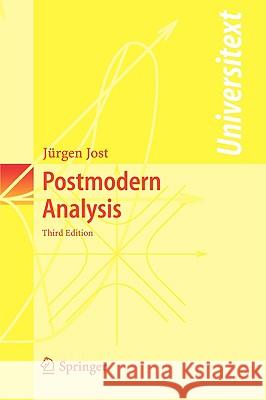Postmodern Analysis » książka
Postmodern Analysis
ISBN-13: 9783540258308 / Angielski / Miękka / 2005 / 375 str.
What is the title of this book intended to signify, what connotations is the adjective "Postmodern" meant to carry? A potential reader will surely pose this question. To answer it, I should describe what distinguishes the - proach to analysis presented here from what has by its protagonists been called "Modern Analysis." "Modern Analysis" as represented in the works of the Bourbaki group or in the textbooks by Jean Dieudonn e is characterized by its systematic and axiomatic treatment and by its drive towards a high level of abstraction. Given the tendency of many prior treatises on analysis to degenerate into a collection of rather unconnected tricks to solve special problems, this de?nitely represented a healthy achievement. In any case, for the development of a consistent and powerful mathematical theory, it seems to be necessary to concentrate solely on the internal problems and structures and to neglect the relations to other ?elds of scienti?c, even of mathematical study for a certain while. Almost complete isolation may be required to reach the level of intellectual elegance and perfection that only a good mathem- ical theory can acquire. However, once this level has been reached, it can be useful to open one's eyes again to the inspiration coming from concrete external problems.











